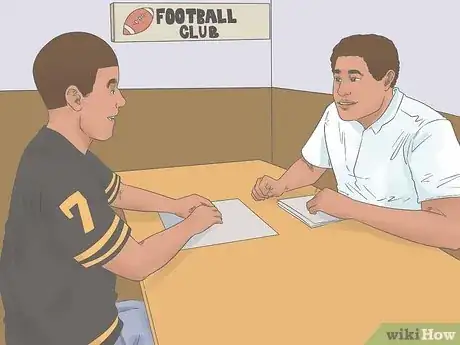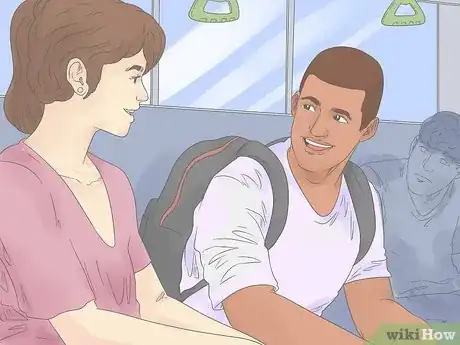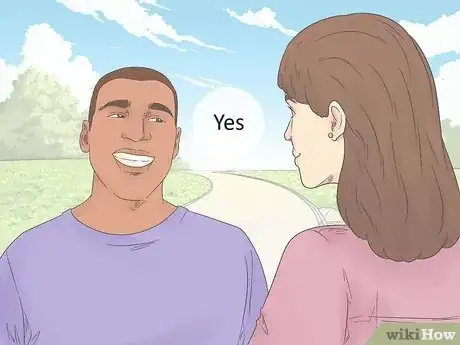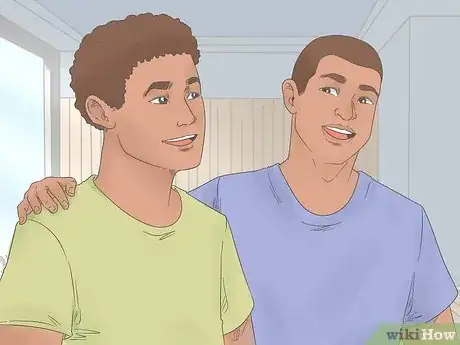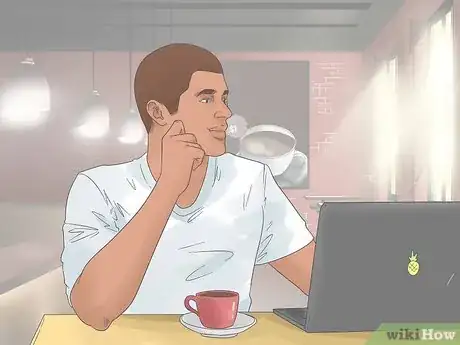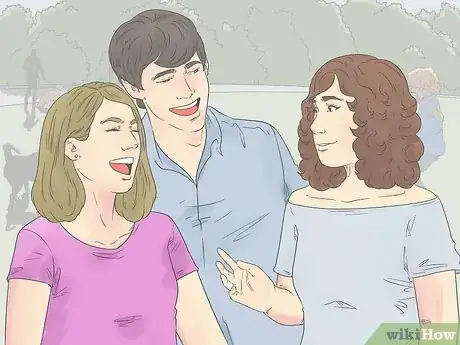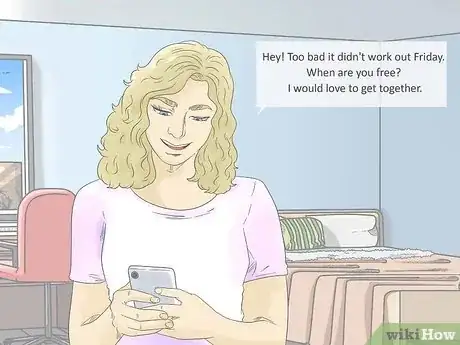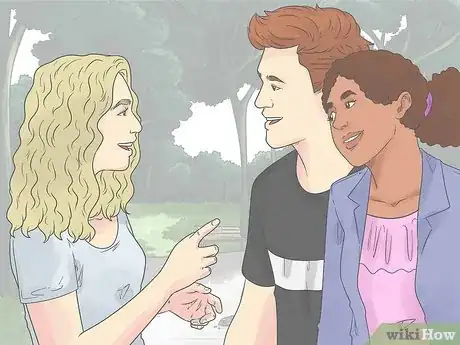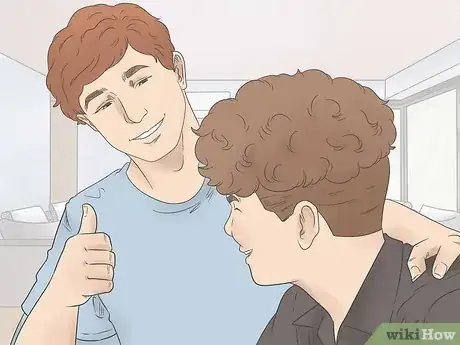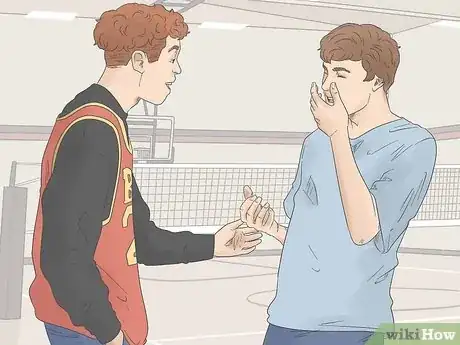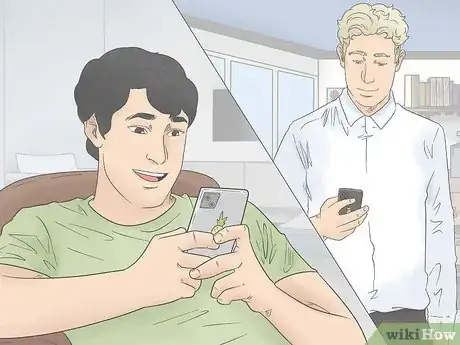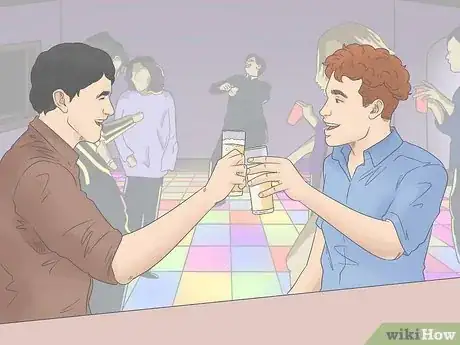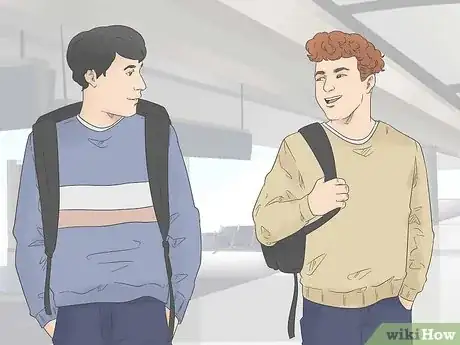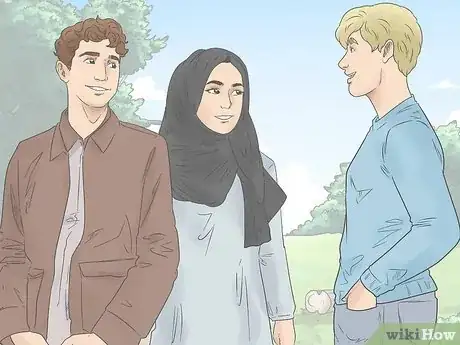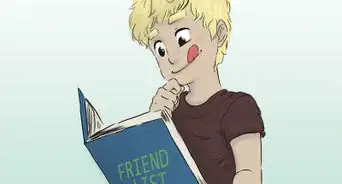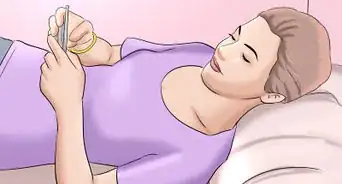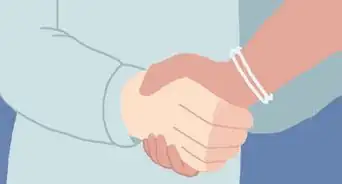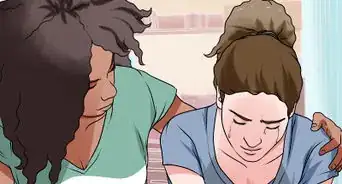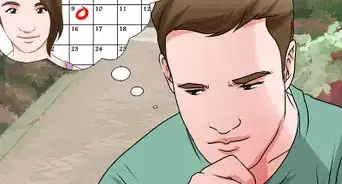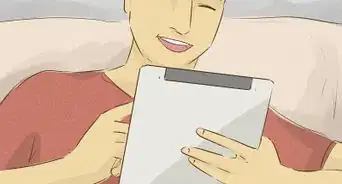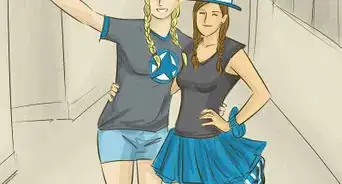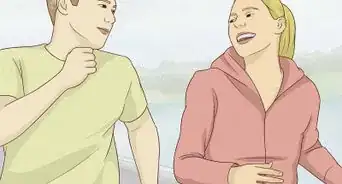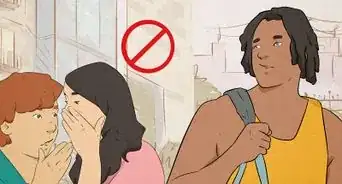This article was co-authored by Kevin Wang. Kevin Wang is a Social Events Specialist and the Founder and CEO of Amiccio, a New York City social app and social events platform that helps people make new connections. Kevin’s work focuses on connecting singles and new friends by hosting socials, dance classes, and speed dating events. He holds a BS in Economics from Duke University.
There are 9 references cited in this article, which can be found at the bottom of the page.
This article has been viewed 116,409 times.
Finding good friends and meaningful relationships as an adult can be difficult. With our busy lives, friendships are not just hard to start, but hard to maintain. Good friendships are built on mutual respect, an appreciation for spending time together, and enjoying common interests. With a little work, you can find friends as an adult.
Steps
Meeting People
-
1Join a club. Clubs can be a great place to meet new people. You're more likely to make friends with people who share your interests and passions. Try joining a club related to an activity you love.[1] [2]
- Do you love books? Join a book club. Are you an avid sports fan? Try joining a local football or softball league.[3]
- You can go to a local community center and see what types of clubs they offer. You can also look for clubs online through sites like MeetUp. Check out alumni events for your high school, college, sorority, fraternity, etc.
-
2Reach out to others when you go out. Make a habit of putting yourself out there in public. You never know who may become a friend. The random stranger you meet on the subway or the person you strike up a conversation with in a bar bathroom may become a lifelong pal.[4]
- Try to be more social. If someone starts talking to you, talk back. Obviously, if you feel uncomfortable with someone, disengage, but try to give new interactions a chance.
- If you meet someone interesting at, say, a coffee shop, try exchanging numbers or social media profiles. You can get together with this person later for a drink or coffee.
- Consider trying to talk to one new person every time you go out. This small goal can help build comfort with meeting new people as you practice over time.
- Try, too, attending events with a social component — such as lectures or town hall meetings with group/public participation. This can increase your chances of finding someone you have interests in common with.
Advertisement -
3Say "Yes" to more activities. If you want to meet people, put yourself out there. Work on saying "Yes" more. You will end up making friends if you agree to be social more often.[5]
- If a co-worker invites you to a party, go. Even if you feel lukewarm about this co-worker, you never know what could happen. There could be someone fun and interesting at the party who you become friends with.
- Try saying "yes" to Facebook invitations. You may not know the friend of a friend who invited you to their birthday party, but you may meet people there. This is also an opportunity to get to know an existing acquaintance more.
-
4Make friends with family members. If you're having trouble meeting new people, try reaching out to family. It can sometimes be hard to be friends with siblings, cousins, and other family members when growing up, as rivalries and arguments get in the way; however, many people find close friends in family members later in life.[6]
- If you and a sibling or cousin live in the same town, try making plans more often. The two of you may find you get along great as friends in adulthood.
- Many people form strong bonds of friendship with family members. As you get older, you may find a sibling or a cousin becomes a best friend.
-
5Become a regular somewhere. Is there a coffee shop you love or a bar you enjoy? Try becoming a regular. Many people end up making friends simply by hanging out at a bar or coffee shop. Eventually, you'll get to know the staff and other patrons.[7]
- Don't be shy about going out alone. Many people enjoy having a drink or a cup of coffee on their own once in awhile.
- Bring a book or a laptop if that makes you feel more comfortable, just be mindful to make conversation with people and appear approachable.
Making Plans
-
1Do not be afraid to initiate get togethers. Many people feel awkward reaching out to a potential new friend. While making friends feels easy and natural in childhood or school, you often feel odd doing the same as an adult. Try to remember other people are as eager to make friends as you. Don't be shy about sending someone a text or making a phone call.[8]
- Don't feel like your friendship is unwanted if you have to initiate the first hang out. The other person may be shy or busy.
- Send a text or make a phone call asking the person to hang out. It can be something simple. For example, "Hey! We met at Julia's party last week. Do you want to get together for drinks this Friday like we talked about?"
-
2Follow up. In adulthood, there are a lot of obligations. People do get busy with work, family, and other issues. If someone passes on an invitation, do not get discouraged. In all likelihood, it was not personal. The other person probably was genuinely busy.[9]
- Wait a week and text something like, "Hey! Too bad it didn't work out Friday. When are you free? I would love to get together."
- Don't get discouraged if it takes a while to form a solid plan. Many people are genuinely busy. The two of you may end up having conflicting schedules for a bit before you can start forming a friendship.
-
3Share experiences. Make plans centered around shared experiences. People tend to bond through sharing things. You're also likely to find more friends by pushing yourself to experience more out of life.[10]
- Experience things you both enjoy. If you met in a cooking class, for example, try cooking a meal together. If you met on a sports team, go for a hike.
- While sharing experiences, strive to meet new friends together. The two of you can be open to chatting up strangers in a bar or joining a few mutual friends for a dinner party.
-
4Accept invitations. Just as you extend invitations, strive to accept them. You're more likely to meet new people and make new friends if you show up. You'll get invited out more if you're consistently the person who's always there and ready to have fun.[11]
- Try to say "Yes" as often as you can. If a friend invites you to coffee, go even if you have to tweak your schedule. If you want to make and find new friends, sometimes you have to make time for this.
- Make sure and thank the person who invited you after the event. This will reinforce to them that you like being included.
Forming Strong Bonds
-
1Strive for one-on-one time. Friendships can blossom with a series of one-on-one interactions. It can be fun to go out in a big group now and again; this can also be a way to meet people and make friends. However, try to have one-on-one time with people you really click with. This can help a strong friendship develop.[12]
- If you meet someone you click with in a big group, reach out to them. Invite them out to dinner or for a drink. The two of you can spend some time chatting and getting to know one another more in depth.
- Keeping the first one-on-one encounter brief can help keep the potential friend interested and feeling positive about the future of the friendship.
-
2Don't be afraid to get personal. Push beyond small talk. Bonds tend to form when people feel vulnerable. As you start to get close to someone, confess some deeper information. Talk about your secrets, insecurities, dreams, and more. Sharing sensitive information with someone can strengthen a bond.[13]
- Laugh at yourself! Find something you did that day or something about yourself that you can poke fun at — this is generally endearing to people.
- However, make sure not to share sensitive information with someone until you're sure you can trust them.
-
3Communicate regularly. If you want to build a strong friendship, communication is important. Make an effort to talk to your friend as often as possible.[14]
- If you met your friend at a club or meeting, chat that friend up each time you get a chance. Sit next to your new friend in meetings so you can talk before and after meetings.
- Text when you can. It's easy to have strong, interesting conversations via text.
-
4Do little things to keep the friendship strong. Friendship builds over time, and small gestures can go a long way towards keeping a friendship strong. Pick up your friend's favorite treat if they've had a bad day. Buy your friend a drink at the bar. Send your friend a text if you see something that reminds you of them while you're out on the town. Slowly, you will begin to form a stronger bond.[15]
-
5Take trips together. Propose a road trip. The two of you can go out of town for the day to a spa or out for a hike. A road trip, even a short one, can give you time to bond.[16]
- New experiences help foster strong friendships. If there's something the two of you have always wanted to do, try it together. For example, take a trip to a mountain range you've always wanted to hike together.
-
6Give it time. Be patient. It takes around six to eight meaningful interactions before you will really feel like you're friends with someone. You cannot force friendship to take place overnight. Allow your friendship to develop at its own pace.
Expert Q&A
-
QuestionIs it hard to make friends after 25?
 Kevin WangKevin Wang is a Social Events Specialist and the Founder and CEO of Amiccio, a New York City social app and social events platform that helps people make new connections. Kevin’s work focuses on connecting singles and new friends by hosting socials, dance classes, and speed dating events. He holds a BS in Economics from Duke University.
Kevin WangKevin Wang is a Social Events Specialist and the Founder and CEO of Amiccio, a New York City social app and social events platform that helps people make new connections. Kevin’s work focuses on connecting singles and new friends by hosting socials, dance classes, and speed dating events. He holds a BS in Economics from Duke University.
Social Events Specialist Not necessarily! The most important thing is taking the initiative to put yourself out there in different situations (when it's possible). Being active and finding social hobbies and events will help you meet new people by sheer exposure. Finding common ground through interests and activities will then help you solidify the bond with new friends!
Not necessarily! The most important thing is taking the initiative to put yourself out there in different situations (when it's possible). Being active and finding social hobbies and events will help you meet new people by sheer exposure. Finding common ground through interests and activities will then help you solidify the bond with new friends! -
QuestionIs it normal for someone to have no friends?
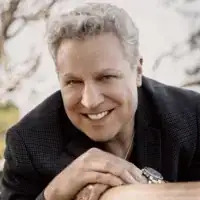 Adam Dorsay, PsyDDr. Adam Dorsay is a licensed psychologist in private practice in San Jose, CA, and the co-creator of Project Reciprocity, an international program at Facebook's Headquarters, and a consultant with Digital Ocean’s Safety Team. He specializes in assisting high-achieving adults with relationship issues, stress reduction, anxiety, and attaining more happiness in their lives. In 2016 he gave a well-watched TEDx talk about men and emotions. Dr. Dorsay has a M.A. in Counseling from Santa Clara University and received his doctorate in Clinical Psychology in 2008.
Adam Dorsay, PsyDDr. Adam Dorsay is a licensed psychologist in private practice in San Jose, CA, and the co-creator of Project Reciprocity, an international program at Facebook's Headquarters, and a consultant with Digital Ocean’s Safety Team. He specializes in assisting high-achieving adults with relationship issues, stress reduction, anxiety, and attaining more happiness in their lives. In 2016 he gave a well-watched TEDx talk about men and emotions. Dr. Dorsay has a M.A. in Counseling from Santa Clara University and received his doctorate in Clinical Psychology in 2008.
Licensed Psychologist & TEDx Speaker Like, not even one? Sometimes, we tend to say "no friends" when we really mean "very few friends." It's about quality, not quantity! If someone genuinely has zero friends, then no, it's not normal (although I don't like that word for it). Friends are pretty important and humans are naturally social creatures, so people usually have at least one good friend.
Like, not even one? Sometimes, we tend to say "no friends" when we really mean "very few friends." It's about quality, not quantity! If someone genuinely has zero friends, then no, it's not normal (although I don't like that word for it). Friends are pretty important and humans are naturally social creatures, so people usually have at least one good friend. -
QuestionHow can I tell if someone is a good friend?
 Adam Dorsay, PsyDDr. Adam Dorsay is a licensed psychologist in private practice in San Jose, CA, and the co-creator of Project Reciprocity, an international program at Facebook's Headquarters, and a consultant with Digital Ocean’s Safety Team. He specializes in assisting high-achieving adults with relationship issues, stress reduction, anxiety, and attaining more happiness in their lives. In 2016 he gave a well-watched TEDx talk about men and emotions. Dr. Dorsay has a M.A. in Counseling from Santa Clara University and received his doctorate in Clinical Psychology in 2008.
Adam Dorsay, PsyDDr. Adam Dorsay is a licensed psychologist in private practice in San Jose, CA, and the co-creator of Project Reciprocity, an international program at Facebook's Headquarters, and a consultant with Digital Ocean’s Safety Team. He specializes in assisting high-achieving adults with relationship issues, stress reduction, anxiety, and attaining more happiness in their lives. In 2016 he gave a well-watched TEDx talk about men and emotions. Dr. Dorsay has a M.A. in Counseling from Santa Clara University and received his doctorate in Clinical Psychology in 2008.
Licensed Psychologist & TEDx Speaker I like to do something called the "drive home" test. When you leave after seeing them, ask yourself "Do I feel better? Do I feel taller? Am I happier right now?" If the answers are yes, then it's probably a productive and healthy friendship.
I like to do something called the "drive home" test. When you leave after seeing them, ask yourself "Do I feel better? Do I feel taller? Am I happier right now?" If the answers are yes, then it's probably a productive and healthy friendship.
References
- ↑ Kevin Wang. Social Events Specialist. Expert Interview. 15 July 2022.
- ↑ http://www.canadianliving.com/life-and-relationships/relationships/article/how-to-make-new-friends-as-an-adult
- ↑ Kevin Wang. Social Events Specialist. Expert Interview. 15 July 2022.
- ↑ http://www.canadianliving.com/life-and-relationships/relationships/article/how-to-make-new-friends-as-an-adult
- ↑ http://stylecaster.com/how-to-make-friends-as-an-adult/
- ↑ http://hellogiggles.com/guide-making-friends-adult/2/
- ↑ http://time.com/4085138/adult-friendship-advice/
- ↑ http://www.refinery29.com/how-to-make-friends-as-an-adult#slide-1
- ↑ http://stylecaster.com/how-to-make-friends-as-an-adult/
- ↑ http://time.com/4085138/adult-friendship-advice/
- ↑ http://stylecaster.com/how-to-make-friends-as-an-adult/
- ↑ http://www.refinery29.com/how-to-make-friends-as-an-adult#slide-2
- ↑ http://time.com/4085138/adult-friendship-advice/
- ↑ http://www.canadianliving.com/life-and-relationships/relationships/article/5-ways-to-make-your-friendships-last
- ↑ https://www.psychologytoday.com/blog/friendship-20/201406/six-ways-strengthen-your-best-friendships
- ↑ https://www.psychologytoday.com/blog/friendship-20/201406/six-ways-strengthen-your-best-friendships
